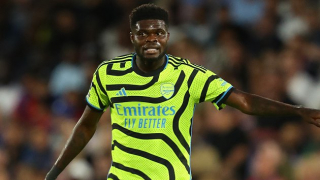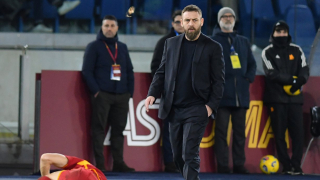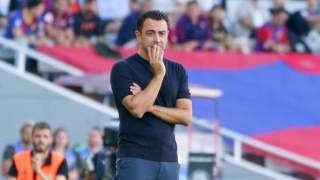This week, we feature the advancements of the women's game in Saudi Arabia, which has quickly grown its commitment to women's football after banning women from attending football stadiums for any games only a few years ago.
We also look briefly at Qatar, where Saudi Arabia's women's national team coach Monika Staab once worked, and who's women's national team has been dormant for almost a decade.
Saudi Arabia—Women's national team does well in its first year and news on the women's league and on the referring side
The Saudi Arabia women's national team, which was first organized in November 2021 and is coached by veteran German coach Monika Staab, beat the Seychelles (of the Confederation of African Football—CAF—and ranked 165th in the latest FIFA rankings of national teams out of 187 teams) 2-0 in their first official match on February 20, 2022 in Male, Maldives. They then beat the host nation Maldives (of the Asian Football Confederation—AFC—and ranked 159th) four days later by the same 2-0 scoreline. Then in August of 2022, the Saudi Arabian WNT traveled to Austria and played two local league sides, defeating Pinzgau Saalfelden of the Austrian third tier (6-1) and then drew Bavarian (Germany) side DJK Taunstein (0-0) of the seventh tier Bavarian County Premier League. In September at home, they then hosted two internationals in Abha against Bhutan (of the AFC and ranked 177th), finishing with a 3-3 tie and a 4-2 loss, the latter their first ever defeat and only one to date.
Then in January of 2023, in a tournament at home in Khobar, they beat Mauritius 1-0 on January 11 (of CAF and ranked 187th and at the bottom of the WNT rankings), and then defeated Comoros 2-0 (of CAF and ranked 182nd) on January 15, followed by a 0-0 draw with Pakistan (of the AFC and ranked 160th) on January 19. Saudi Arabia thus won the International Women's Friendly Championship Cup with a total of seven points, with Pakistan second on four points.
Saudi Arabia's women's national team captain Bayan Sadagah (#2) receives the International Women's Friendly Championship title from the President of the Saudi Arabian Football Federation, Yasser bin Hassan Al-Misehal (far left). Photo courtesy of the Saudi Arabia Football Federation.
Saudia Arabia, still unranked as a new WNT, should be ranked later this year in the FIFA rankings and, with their impressive results thus far, they certainly won't be at bottom of the FIFA (or AFC ratings). How high they land will be interesting to see and hopefully will drive more attention and funding for women's football in the nation, which has come so far since the country only began to allow women to attend football matches of any type in 2018 (five years after Bahrain allowed women into stadiums beginning in 2013), while also previously citing cultural norms and religious precedent in limiting women's access to participation in sports. Some conservative clerics in the country said that women's involvement in sport would lead to immorality.
Monika Staab has to be given a mammoth amount of credit for Saudia Arabia's strong record in internationals to date. This author talked to her on multiple occasions starting after the 2007 Women's World Cup in China, who was featured in my Asian chapter of my book Beyond Bend It Like Beckham (2012). At the time, she was working in Pakistan as FIFA's Women's Football Specialist for Asia, in a role that has taken her to Qatar (2013-2014), Bharain (2007)—where she was the women's national team coach in both countries—as well hosting coaching clinics in Iran, Jordan, Myanmar and Sri Lanka. Staab has played or coached soccer since 1969, before the German Federation allowed organized play.
She described her role to me at the time as much more eclectic than just running training sessions: "Well I probably can call myself a missionary as most of the countries I have visited are just starting to play women's football...."
She has always been optimistic about the future of the sport in the region and told me: "I hope every Muslim country, with the exception of Saudi Arabia, where women's football is officially forbidden, will have a national team in five years' time. I hope I can do my contribution to this. In ten years' time, every country should have a league competition throughout the year, as most of them play a tournament once a year. In twenty years, I hope women's football is accepted in society and every girl who wishes to play football can go out in the street and play it." Moving ahead a decade and even Saudi Arabia has women's football and there are growing signs of the increased acceptance of the game in the region.
There certainly has been progress over the past 10-15 years in the region, with Morocco hosting the Women's African Cup of Nations last summer to strong crowds, capping with almost 50,000 fans at the final, where they lost 2-1 to South Africa, but still qualified for this summer's Women's World Cup (See: The Week on Women's Football: Africa Cup of Nations Finals review - Tribal Football) as the first Arab nation to make the Women's World Cup Finals.
Drawn in Group H in Australia for the first round against two-time former champions Germany, Colombia and Korea Republic, Morocco will have more opportunities to feature the women's game to a global audience and particularly in North Africa/West Asia.
Staab (62) has worked in 85 countries over the last 14 years and moved to Saudi Arabia from Gambia, where she was working. Staab told FIFA.com that she was first called by Saudi Arabian Football Association officials in November of 2020: "My phone rang and I saw that it was a 966-country code and had no idea who it was. I thought to myself: 'Come on, what have you got to lose?' And then the person said: 'This is the Saudi Arabian Football Association. We'd like to bring you over for our first C-licence coaching course for women.' I thought: 'Sorry, what? Saudi Arabia?' I thought that nothing could ever surprise me and then this came along. They asked if I could give the coaching course in December and I said: 'Count me in!' In the 51 years that I've been involved in women's football, the main thing for me has always been to give women the opportunity to play football. I might not be able to change everything in people's lives, but I can give them hope. I give them the spark; it's up to them to light the fire."
In her year since Saudi Arabia's WNT has been playing, Staab has been impressed with her players, "What's happening here has to be seen to be believed. It's unbelievable, it really is. These women have a sense of freedom in that they can finally express their love for the sport. In ten years' time, they want to play at the Women's World Cup, and I said to them: 'Slow down! It took Germany 21 years and you want to do it in ten? That's not going to happen.' But they have a dream and they're getting support from the President and the GS [General Secretary] of the national football association, so what more could you want?"
Staab is ambitious in her new role and is helping Saudi Arabia institute the necessary infrastructure to help the game grow: "We want to create a total of 13 regional training centres for U-13, U-15 and U-17 players—the first is almost finished—and by the end of next year, we're looking to have a women's U-17 national team. We're on the right track here. We know that you have to build on a solid foundation. We have seven-, eight- and nine-year-olds in this academy that is just for girls. They have training twice a week, and the parents even want them to train three times. People are prepared to invest in the future here. I've spoken to a lot of the parents and they're all very open to the idea."
With 37 out of 47 Asian Football Confederation nations currently ranked in FIFA's latest ranking of women's national teams (as of December 9, 2022), we hope to see Saudi Arabia ranked in the next addition and more progress for women's national teams in Iraq, Kuwait, Oman, Qatar, United Arab Emirates and Yemen, who are among those in the Asian Football Confederation who remain unranked, not having played enough games (or any) to qualify. Arab and Islamic nations have shown some strong recent progress but still have some distance to go in introducing and building development structures for women. After a point, social change will be needed before there is vibrant girls' and women's soccer like there is in Northern Europe or North America. Staab's efforts in the region are paying off with an end result of be confident, fit girls and women who have fun while learning cooperation in a team environment. They will have earned invaluable life lessons even if they never play in a Women's World Cup.
Monica Staab called in 25 players for the January 2023 internationals, who all play their club ball in Saudi Arabia:
G Nawal Khaled (Al-Hilal)
G Sarah Khaled (team captain) (Al-Nassr)
G Laila Ali (Al-Yamamah)
G Mona Abdel-Rahman (Al-Hilal)
D Lin Muhammad (Al-Yamamah)
D Bayan Sadaqa (Al-Ittihad)
D Tala Al-Ghamdi (Al-Ittihad)
D Dalal Abdel-Latif (Al-Yamamah)
M Hala Khashoggi (Al-Ittihad)
D Lana Abdel-Razzaq (Al-Ittihad)
M Aseel Saleh (Al-Nassr)
M Shorouk Al-Hawsawi (Al-Hilal)
M Raghad Helmy (Al-Shabab)
M Raghad Mukhaizen (Al-Shabab)
M Sarah Hamad (Al-Yamamah)
M Maryam Al-Tamimi (Eastern Flames)
M Layan Johari (Al-Ittihad)
M Saba Tawfiq (Al-Ittihad)
F Majd Al-Otaibi (Al-Yamamah)
F Juri Tariq (Al-Ittihad)
F Al-Bandari Mubarak (Al-Yamamah)
F Mubarakah Muhammad (Al Nassr)
F Fatima Mansour (Al-Yamamah)
F Noura Ibrahim (Al-Yamamah)
F Fadwa Khaled (Al-Ahli)
Saudi Arabia has a Premier Women's League with 8 teams and a 17 team First Division (Second Tier)—with the teams divided into five groups. In the Women's Premier League for the 2022-23 season, Al Nassr leads the table after 10 games with 23 points, one point ahead of Al Hilal, who have 22 points. Other top league sides include Ittihad (19 points), Al Yamamah (17 points), Al Shabab (17 points), Al-Ahli (10 points), Eastern Flames (5 points) and Sama (0 points).
Saudi Arabia has also announced their first female international football referee, Anoud Al-Asmari (34), who will handle men's and women's matches. Saudi Arabia has been in the news of late for their upset of Argentina in the first round of the men's World Cup in Qatar late last year and Portuguese international star Cristiano Ronaldo's signing with Al-Nassr.
Al-Asmari said: "I am happy to be the first Saudi female referee to receive the international badge in the history of Saudi sports."
She is one of eight Saudis on the international panel announced by FIFA.
Note: It needs to be noted that 2022 FIFA World Cup in Qatar was not the first World Cup to be held in the Middle East; that indeed was the 2016 U-17 Women's World Cup in 2016 in Jordan. Jordan also held the 2018 AFC Women's Asian Cup Tournament, which doubled as the 2019 WWC Qualifiers for the region.
Regarding Qatar, where women have to obtain permission from a male guardian before they can take a job, study, travel abroad or get married, we are still waiting for their first international since Monika Staab coached the side back in April of 2014, when they played at the West Asian Football Federation Women's Championship in Amman, Jordan. Staab said she left Qatar because the Women's Sport Committee wanted a man as coach and someone who spoke Arabic, which she did not. It has still never won an official match, but was competitive against Maldives while Staab was there, with two losses: (3-0) and (1-0).
Qatar's team was founded in 2009 and lost its inaugural match at the Arabia Women's Cup to Bahrain (17-0) and then lost to Syria and Palestine by double digits in each.
The Qatar women's national team before a match in 2012. Photo credit: Isabelle Eshraghi/Agence VU, via Redux.
The Washington Spirit went to Qatar with a few executives and players in late 2020, which we wrote about in early 2021: (see: The Week in Women's Football: Interview with Ukraine star Kozlova; Damallsvenskan shock; Spirit visit Qatar - Tribal Football) but it did not involve a game with the Qatari WNT. A cultural exchange trip by five female coaches, players and administrators to New York and San Francisco in 2022 also did not involve a National Team match, which is interesting.
Monika Staab, Qatar's women's national team's former coach, in 2014. Photo credit: Isabelle Eshraghi/Agence VU, via Redux.
Qatar spent lavishly to host the men's World Cup in 2022 and needs to provide its WNT with games so that they gain the experience they so dearly need after not playing any competitive matches for almost a decade, and thus be able to enter and start moving up the FIFA and AFC rankings of national sides.
Tim Grainey is a contributor to Tribal Football. His latest book Beyond Bend it Like Beckham is on the global game of women's football. Get your copy today.
Follow Tim on Twitter: @TimGrainey
























